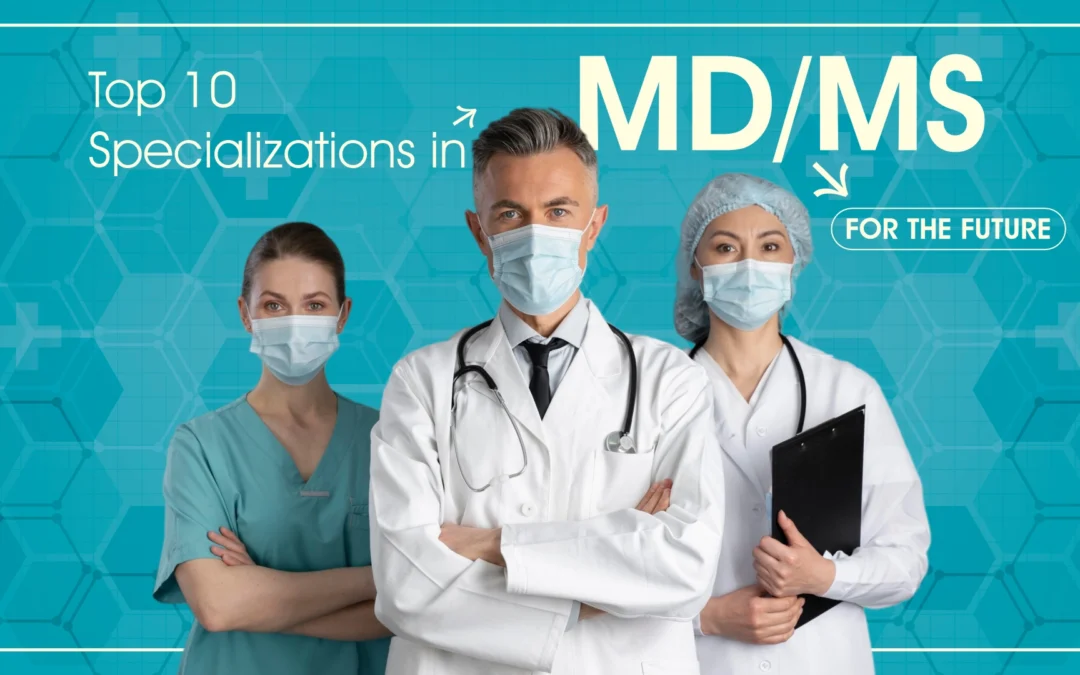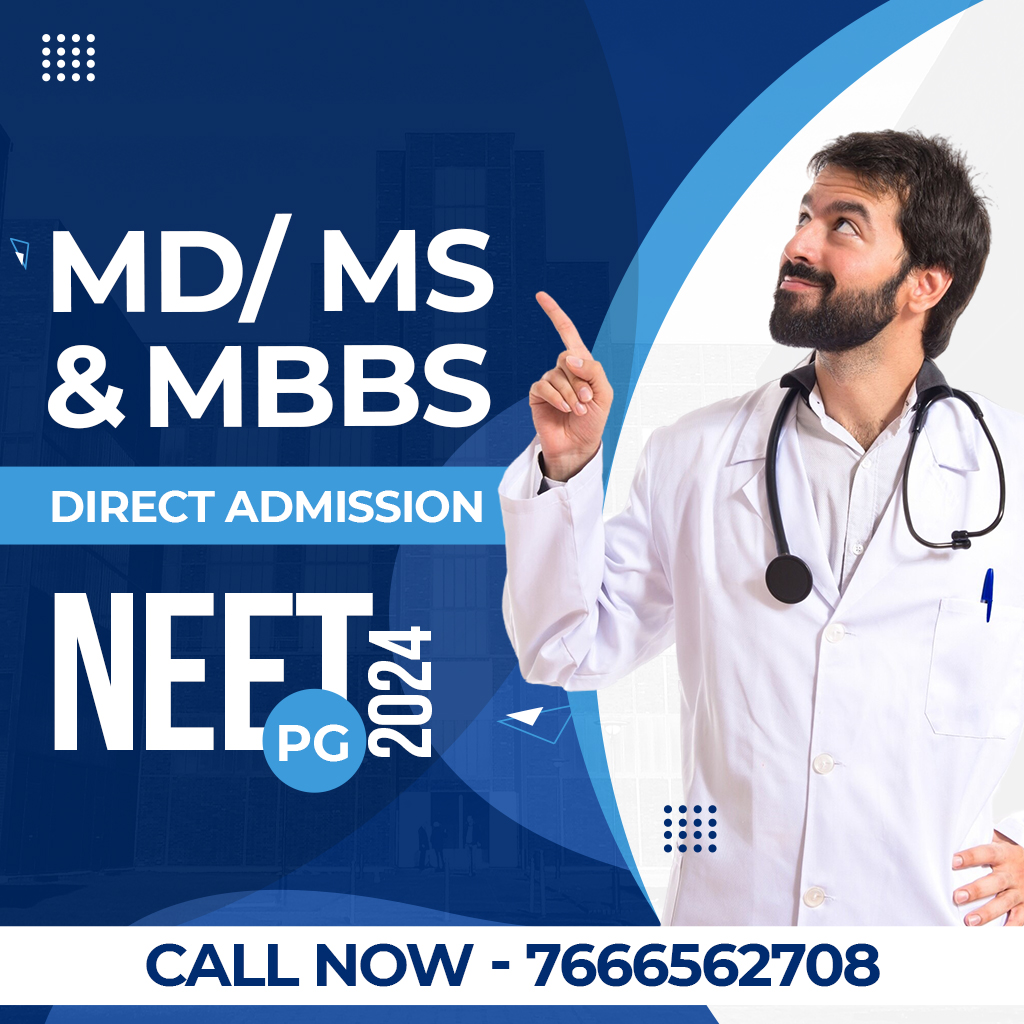The medical landscape is rapidly transforming, driven by technological advancements, demographic shifts, and emerging health challenges. These changes reshape the healthcare industry, creating new opportunities and challenges for aspiring medical professionals. To thrive in this dynamic environment, choosing a specialization that aligns with personal interests and future trends is crucial. This article delves into the top 10 specializations in MD/MS that hold immense promise for the future, considering factors such as technological advancements, demographic shifts, and emerging health challenges.
Why Choose the Right Specialization?
Selecting the appropriate MD/MS specialization is like charting a career trajectory. While personal interests and aptitudes are paramount, considering future trends in healthcare is equally crucial. The ideal specialization should align with your passions, capitalize on your strengths, and offer promising career prospects.
Several factors influence specialization selection. Your academic background, research interests, and clinical experiences can provide valuable insights. Exploring different medical fields during your undergraduate studies or internships can help you identify areas that resonate with you. Additionally, understanding the job market, salary expectations and work-life balance associated with various specializations is essential for making informed decisions.
Top 10 Specializations in MD/MS for the Future
Digital Health and Telemedicine
The convergence of healthcare and technology is ushering in a new era of patient care delivery. Digital health and telemedicine specialists are at the forefront of this revolution, developing and implementing innovative solutions to address the evolving needs of patients and healthcare providers.
From remote consultations and patient monitoring to data-driven healthcare and virtual reality-enhanced medical education, the scope of digital health and telemedicine is vast and ever-expanding. These specialists possess a unique blend of medical knowledge and technological expertise, enabling them to bridge the gap between traditional healthcare and the digital world.
AI and Machine Learning in Medicine
Integrating artificial intelligence (AI) and machine learning revolutionizes medical diagnosis, treatment planning, and drug discovery. Physicians with expertise in these domains will be at the forefront of developing AI-powered tools to improve patient outcomes.
AI has the potential to analyze vast amounts of medical data, identify patterns, and predict disease progression more accurately than human experts. This can lead to earlier detection of diseases, more personalized treatment plans, and improved patient outcomes. Machine learning algorithms can also develop new drugs, accelerate clinical trials, and optimize healthcare resource allocation.
Genomics and Personalized Medicine
Genomics has ushered in an era of personalized medicine, where healthcare is tailored to an individual’s unique genetic makeup. Physicians specializing in genomics will play a pivotal role in deciphering complex genetic information to identify disease susceptibility, predict treatment responses, and develop targeted therapies.
By analyzing an individual’s genetic profile, physicians can identify specific genetic variations associated with certain diseases, allowing for early detection and intervention. This approach holds immense potential for preventing and treating diseases such as cancer, cardiovascular disease, and rare genetic disorders.
Furthermore, genomics can be used to optimize drug selection and dosage, minimizing adverse side effects and maximizing treatment efficacy. By understanding a patient’s genetic makeup, physicians can select the most appropriate medications and adjust dosages accordingly, improving patient outcomes.
Gerontology and Geriatrics
The aging population presents a significant and growing challenge for healthcare systems worldwide. As people live longer, the prevalence of chronic diseases and age-related conditions is increasing, demanding specialized care and expertise. Gerontology and geriatrics focus on the comprehensive health and well-being of older adults, encompassing aging’s physical, mental, social, and functional aspects.
Geriatricians deeply understand the physiological changes associated with aging, common geriatric conditions, and the unique needs of older patients. They are skilled in diagnosing and managing complex medical conditions, often co-existing with multiple chronic diseases. Additionally, geriatrics emphasizes preventive care, health promotion, and maintaining independence among older adults.
Global Health
As the world becomes increasingly interconnected, global health challenges require collaborative solutions. Physicians specializing in global health will work to improve healthcare systems in developing countries, control infectious diseases, address global health disparities, and promote health equity.
Global health specialists possess a broad understanding of public health principles, epidemiology, and international development. They are equipped to address complex health issues at both the individual and population levels. Moreover, they collaborate with diverse stakeholders, including governments, non-profit organizations, and communities, to implement sustainable and culturally appropriate health interventions.
Key areas of focus for global health specialists include infectious disease control, maternal and child health, nutrition, reproductive health, and disaster preparedness. They often work in resource-limited settings, requiring adaptability, problem-solving skills, and a commitment to social justice.
Infectious Disease
The emergence of new infectious diseases, such as COVID-19, and the persistent threat of antimicrobial resistance underscore the critical role of infectious disease specialists. These physicians deeply understand the epidemiology, pathogenesis, and clinical management of infectious diseases. They are at the forefront of developing and implementing strategies to prevent, control, and treat infectious outbreaks.
Moreover, infectious disease specialists are crucial in public health surveillance, outbreak investigation, and response. They collaborate with public health officials, healthcare providers, and other stakeholders to contain the spread of infectious diseases and minimize their impact on communities.
Public Health
Public health is a cornerstone of modern healthcare, encompassing a wide range of activities aimed at improving and protecting the health of entire populations. Public health professionals are at the forefront of addressing complex health challenges like chronic diseases, infectious disease outbreaks, and environmental hazards. They collaborate with diverse stakeholders, including government agencies, healthcare providers, community organizations, and policymakers, to develop and implement effective public health interventions.
Key areas of focus within public health include epidemiology, biostatistics, environmental health, health education, and health policy. Public health professionals are crucial in conducting research, analyzing data, and identifying trends to inform public health policies and programs. They also work to educate and empower communities to make healthy choices and prevent disease.
Psychiatry and Mental Health
The rising prevalence of mental health disorders necessitates a robust mental healthcare workforce. Psychiatrists and mental health professionals will be essential in providing comprehensive care, reducing stigma, and improving access to treatment.
Mental health disorders, including depression, anxiety, bipolar disorder, and schizophrenia, affect millions of people worldwide, causing significant personal and societal burdens. Psychiatrists play a crucial role in diagnosing and treating these conditions, developing individualized treatment plans, and managing medication. They also work collaboratively with other mental health professionals, such as psychologists, social workers, and counselors, to provide comprehensive care.
Addressing the growing mental health crisis requires a multi-faceted approach, including early intervention, prevention, and destigmatization. Psychiatrists and mental health professionals will be at the forefront of developing innovative strategies to improve mental health outcomes and promote well-being. Moreover, they will be instrumental in advocating for increased access to mental healthcare services and reducing disparities in care.
Surgical Subspecialties
Technological advancements and evolving surgical techniques create opportunities for specialization in various surgical domains. Areas like minimally invasive surgery, robotic surgery, and surgical oncology offer promising career paths for skilled surgeons.
Critical Care Medicine
Critical care specialists manage critically ill patients in intensive care units (ICUs). Their expertise in advanced life support, organ support systems, and patient monitoring is indispensable for saving lives and improving patient outcomes.
Choosing the Right MD/MS Specialization
Selecting a specialization is a complex decision that requires careful consideration of personal interests, career goals, and the evolving healthcare landscape. Researching different specializations, shadowing physicians in various fields, and seeking guidance from mentors can help you make an informed choice.
For those aspiring to pursue higher education in medicine, exploring options like direct MD/MS admission or NEET PG direct admission can provide alternative pathways to medical schools. These programs often offer accelerated learning and specialized curricula, catering to the needs of ambitious medical students.
Take Away
The medical profession offers a diverse range of specializations, each with its own unique challenges and rewards. By carefully considering your passions, skills, and career aspirations, you can select a specialization that aligns with your long-term goals. Embracing continuous learning and staying updated with the latest medical advancements are essential for success in any chosen field.
Remember, the ultimate goal is to provide exceptional patient care and contribute to the betterment of human health.
You may also like this –
Unlocking Opportunities: Direct Admission in Top Medical Colleges of West Bengal
The Ultimate Guide to Mastering MD General Medicine: Tips and Strategies for NEET PG Success



